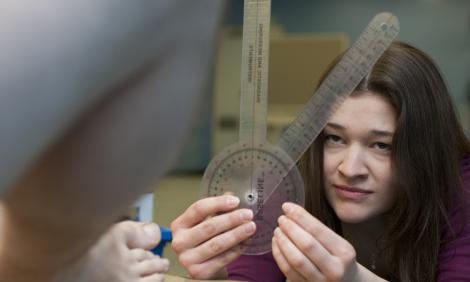Rehabilitation engineering
Rehabilitation engineering encompasses a team of people assessing and responding to the needs of people with disabilities.
In this area of healthcare science, you’ll be involved in designing artificial body parts, measuring walking characteristics to improve the function of artificial limbs, and surgical corrections of deformities.
"I am lucky to be able to see a patient's face as their child stands for the first time." Stephen Luxton, Specialist Rehabilitation Engineer
Working life
Modern techniques such as keyhole and robotic surgery have been achieved with the support of biomechanical engineering.
Healthcare science staff working in rehabilitation engineering are part of the rehabilitation team. They play a key role in the assessment of the individual needs of people with a disability and in the prescription of assistive technology to meet those needs.
In this area of healthcare science, you’ll provide standard and custom-made assistive technology including:
- special seating
- wheelchairs
- artificial limbs
- electronic communicators (such as speech synthesisers)
- robotic aids.
You’re likely to be involved in the designing, building and testing of such assistive technology. You may also be responsible for quality assurance.
Who will I work with?
As part of the rehabilitation team, you would typically work alongside prosthetists and orthotists, physiotherapists, occupational therapists, social workers, specialist nurses, doctors specialising in rehabilitation medicine and equipment manufacturers.
Want to learn more?
-
Most jobs in the NHS are covered by the Agenda for Change (AfC) pay scales. This pay system covers all staff except doctors, dentists and the most senior managers. As a healthcare science practitioner, you’d usually start on band 5, with opportunities to progress to more senior positions. Trainee clinical scientists train at band 6 level, and qualified clinical scientists are generally appointed at band 7. With experience and further qualifications, you could apply for posts up to band 9.
Staff will usually work a standard 37.5 hours per week. They may work a shift pattern.
Terms and conditions of service can vary for employers outside the NHS.
-
With further training or experience or both, you may be able to develop your career further and apply for vacancies in areas such as further specialisation, management, research, or teaching.
Healthcare science staff often work at the forefront of research and innovation, so that clients are continually receiving the very best healthcare. For example, in rehabilitation engineering, you could be undertaking advanced research into the mechanics of the body and developing new assistive technology.
-
Job market
In November 2018, there were 6,123 clinical scientists registered with the Health and Care Professions Council.
The NHS Scientist Training Programme (STP) attracts many more applicants than there are places and so there is considerable competition for places.
Finding and applying for jobs
When you’re looking for job or apprenticeship vacancies, there are a number of sources you can use, depending on the type of work you’re seeking.
Check vacancies carefully to be sure you can meet the requirements of the person specification before applying and to find out what the application process is. You may need to apply online or send a CV for example.
For the STP there is an annual recruitment cycle. Applications usually open in early January for the intake in the following autumn and should be made through the National School of Healthcare Science's website, where you can also find information about the programme and the recruitment process.
Key sources relevant to vacancies in the health sector:
- vacancies in organisations delivering NHS healthcare can be found on the NHS Jobs website
- opportunities in the Civil Service can be found on the Civil Service Jobs website
- vacancies in local government can be found on the Local Government Jobs website and the Jobs Go Public website
As well as these sources, you may find suitable vacancies in the health sector by contacting local employers directly, searching in local newspapers and by using the Universal Jobmatch tool.
Find out more about applications and interviews.
Volunteering is an excellent way of gaining experience (especially if you don’t have enough for a specific paid job you’re interested in) and also seeing whether you’re suited to a particular type of work. It’s also a great way to boost your confidence and you can give something back to the community.
-
For further information about a career in rehabilitation engineering, please contact:





